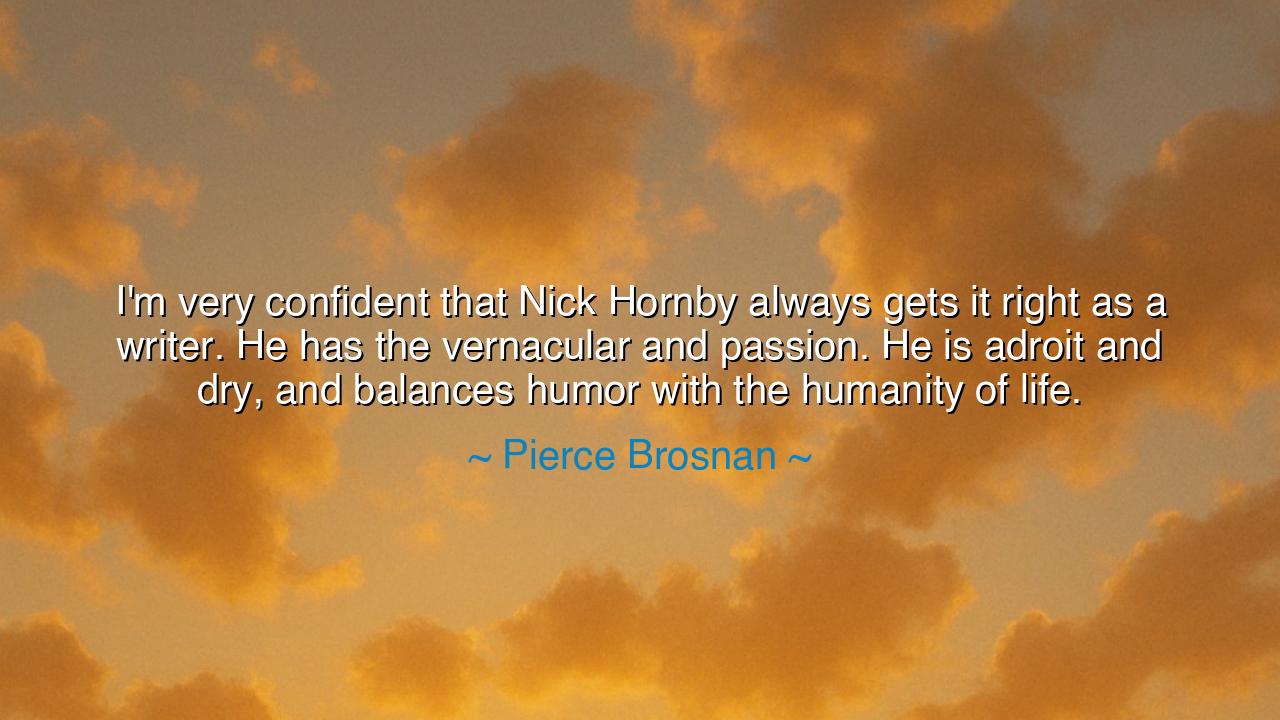
I'm very confident that Nick Hornby always gets it right as a
I'm very confident that Nick Hornby always gets it right as a writer. He has the vernacular and passion. He is adroit and dry, and balances humor with the humanity of life.






When Pierce Brosnan said, “I’m very confident that Nick Hornby always gets it right as a writer. He has the vernacular and passion. He is adroit and dry, and balances humor with the humanity of life,” he spoke not merely as an admirer, but as a man who recognizes the sacred craft of storytelling. Beneath these words lies a deep reverence for the writer’s art—that ancient ability to capture the spirit of humanity with words. In praising Nick Hornby, Brosnan was not just commending a novelist; he was honoring a tradition as old as civilization itself: the weaving of laughter and sorrow into one fabric of truth. For it is the mark of great storytelling to reveal life as it is—tragic, comic, humble, and divine—all in the same breath.
The origin of this reflection comes from Brosnan’s collaboration with Hornby’s work, particularly the adaptation of A Long Way Down, a film based on Hornby’s novel. In the story, four strangers meet on a rooftop on New Year’s Eve, each planning to end their life, and instead find in one another the strange, healing absurdity of existence. Brosnan, having lived a life filled with triumph and loss—the glamour of fame and the ache of tragedy—saw in Hornby’s writing the rare equilibrium of humor and humanity, the kind that makes art not only entertaining, but redemptive. He understood that Hornby’s gift lay not in exaggeration, but in truth spoken plainly, with wit sharp enough to draw laughter and tenderness enough to draw tears.
When Brosnan speaks of Hornby’s vernacular and passion, he points to two pillars of great writing: authenticity and heart. Vernacular is the tongue of the people—the rhythm and color of ordinary life. It is the language that breathes, that lives in cafés, buses, and living rooms. Hornby, like the poets of old, knows that the language of truth is not found in lofty rhetoric, but in the pulse of daily speech. And passion—that sacred fire—gives this language its warmth. Without passion, words are bones without flesh. With it, they become alive. Brosnan recognized this union in Hornby’s art: words that speak like a friend, yet pierce like prophecy.
To be adroit and dry, as Brosnan says, is to wield subtlety like a sword. The dryness of Hornby’s humor is not emptiness—it is restraint, a quiet wit that trusts the reader’s intelligence. His humor is not thunderous; it is a smile in the midst of storm. And that balance—between jest and sincerity, laughter and pain—is what transforms writing from amusement to wisdom. For the greatest humor does not mock life; it redeems it. The writer who can make us laugh while showing us our own frailty performs the alchemy of compassion. He turns suffering into understanding, and loneliness into connection.
The ancients knew this balance well. Consider the playwright Sophocles, who wrote of kings and curses, yet filled his tragedies with moments of strange levity—because he understood that laughter, even in the shadow of fate, makes us more human. Or the philosopher Marcus Aurelius, who taught that to see humor in hardship is to see the smallness of our woes beside the vastness of eternity. In this sense, Hornby walks in the footsteps of these timeless thinkers. His stories are modern parables: filled with self-deprecating laughter, flawed souls, and the quiet miracle of endurance. Brosnan, a man who has known both the masks of comedy and the depths of grief, saw in Hornby’s words the same eternal wisdom—that laughter and pain are not enemies, but brothers.
In every age, there are those who speak to the heart of humanity through their craft. Hornby’s power lies in his refusal to separate humor from sorrow, or intellect from emotion. Brosnan’s admiration reminds us that this harmony is the essence of all great art, whether in word, film, or song. For life itself is a performance of contradictions—joy beside despair, irony beside truth, tragedy beside beauty. To capture that duality is not easy. It demands from the artist what Brosnan calls confidence—a faith in the human spirit’s ability to find meaning even in absurdity.
And so, my children of thought and word, let this wisdom guide you: seek the balance between humor and humanity. Laugh deeply, but never cruelly. Speak simply, but always truthfully. Let your words, like Hornby’s, be born from the common tongue and lifted by passion. In your own craft—whether writing, creating, or living—strive for the courage to reveal life as it is: imperfect yet beautiful, sorrowful yet kind. For when humor meets compassion, art becomes a mirror, and in that reflection, mankind remembers itself.
Thus, Pierce Brosnan’s words stand as a tribute not only to a writer, but to the art of being human: to be adroit yet humble, dry yet tender, to find laughter in pain and meaning in laughter. This is the lesson of all great storytellers and all great souls—to remind us, through the simplest words, that life’s truth lies not in perfection, but in the balance between its contradictions. And when we learn to live with that balance—to laugh while we ache, and to love while we fall—we, too, “get it right.”






AAdministratorAdministrator
Welcome, honored guests. Please leave a comment, we will respond soon